Elizabeth Spann Craig's Blog, page 168
October 24, 2012
A Good Scare for a Great Cause
By Joanne Sydney Lessner, @joannelessner
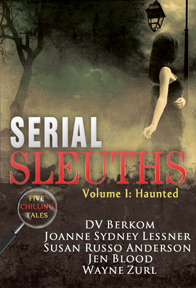
Earlier this month, SerialSleuths, Volume 1: Haunted
hit the Kindle shelves. The brainchild of Jen Blood, author of the Erin Solomon
mysteries, this short story collection features five indie writers and their
series detectives, myself included:
“Death of a Sad Face” by SusanRusso Anderson
Nineteenth-century Sicilian midwife
Serafina Florio defies the local inspector by setting out to prove a connection
between a missing orphan haunted by a hideous specter and the murder of an
affluent family’s butler.
“Let Sleeping Dogs Lie” by DVBerkom
In northern Arizona’s Navajo
country, on-the-run heroine Kate Jones lands in trouble once again when she
stumbles into the world of mysterious sorcerers called Skinwalkers.
“The Stone House” by Jen Blood
Reporter Daniel Diggins finds
himself stranded overnight with nineteen-year-old protégé Erin Solomon while
investigating a two hundred-year-old mass murder in a haunted mansion in Maine.
“The Ghosts’ High Noon” by JoanneSydney Lessner
Enterprising actress Isobel Spice
faces down a theater ghost to learn the truth behind an actor’s mysterious
death during a performance of Gilbert & Sullivan’s gothic operetta Ruddigore.
“Ode to Willie Joe” by Wayne Zurl
When multiple UFO sightings are
reported around town, it’s up to wry and ever-reasonable Tennessee police chief
Sam Jenkins to get to the bottom of the mystery.
Instead of battling a calculator to split the royalties
five ways, Jen suggested we donate the proceeds from the $1.99 e-book to
charity. We enthusiastically agreed and selected Doctors Without Borders
as our beneficiary. On the eve of publication, I sat down (virtually) with my
colleagues to discuss the genesis of our collaboration and its charitable bent.
What gave you the
idea for the anthology?
Jen: I started
thinking about all these authors out there with characters I love, and how much
fun it would be to see those characters in a shorter form that might reach
beyond the pure mystery/thriller structure. Once I started thinking about the
possibilities—ghost stories, romance, holiday themes—I realized it could be
something truly fun to play around with. I didn’t see anyone else doing
anything like it, so I decided to make it happen myself.
How did you solicit
stories for Haunted?
Jen: I
hand-picked the contributors for this one based on books I’d read by the
authors and interviews I’d done with them on my website, BloodWrites. I’ve been so
impressed with their professionalism, and this is a wonderful way to showcase
their work in a new venue. To me, these short stories exemplify not only the
tremendous writing talent of everyone involved, but also the fabulous
characters who carry their respective series.
What did you find
challenging, different, fun or tedious about working in a short form?
Wayne: The challenge for me came with the paranormal
“haunted” theme. I’ve written fifteen Sam Jenkins mystery novelettes, so
presenting a short police story is nothing new. But I spent a fair amount of
time thinking about how I could take a problem generally referred to the police
and give it an “otherworldly” tint. I’m not much of a sci-fi or horror guy, so
I asked my wife for help. She gave me the basic idea for that potentially
unexplained, spooky ingredient.
Susan: I try to
limit the mystery to one murder, but also have my characters grow. Serafina’s
got to grow along her trajectory, which is pretty easy because (don’t tell her
I said this) she’s got issues, but the other characters need to grow, too. I
had a plot in mind, a first and a last scene pretty well thought out, and the
characters just worked mighty hard and wrote the in-between stuff for me: it
was their growth that created the plot.
Joanne: I had
to decide which of my secondary characters to include. Isobel is an office temp
as well as an actress, but there’s no reason for James, her temp agent and my
other POV character, to accompany her on a theater gig. Since she’s doing an
operetta, it made the most sense for her tenor friend Sunil to go, so that’s
who packed his suitcase.
DV: I love
writing a series character (I must, since I'm deep into a second series J).
Getting to know their foibles and strengths, knowing their personalities so
well, their stories practically write themselves.
Jen: The hardest
part was figuring out at which point in the series the story should take place
to make it interesting for both the readers who know Erin’s story and those
just being introduced to the characters. Initially, I wrote the short as having
taken place after the second novel in the series, but realized that was just
completely the wrong way to bring people into Erin’s life. The most fun part by
far was exploring different facets of the characters’ relationship and playing
with a new writing form.
How did you get the
idea for your story?
DV: A few years
back while on a lone cross-country trip, I stopped on the side of the road in
Monument Valley intending to sleep in my car so I could wake up before sunrise
and shoot some photos (I was an itinerant photographer back then). I had an
intense experience that night, involving what I learned later was a Skinwalker,
and have never forgotten how frightening and deliciously intriguing the whole
thing was.
Wayne: When you work as a cop for twenty years in an
overcrowded and always busy area, you encounter plenty of weird people and
strange incidents. I knew a real character like Willie Joe Ballantyne. And getting
complaints that sounded like an episode of the Twilight Zone happened all the
time. In this case, I coupled three real incidents together and added an
element native to the Smoky Mountains—and voilà.
Jen: The story is based on a mass murder that happened in Maine in
1806, so a lot of the details are true: a father went after his family one
night and murdered seven of his eight children and his wife, then killed
himself with a straight razor. I know—gruesome. From there I looked at ways to
make the story resonate more with Erin, who is still coming to terms with an
alleged cult suicide. I altered the details of the true crime a bit and changed
the setting to include Freeport Maine’s Stone House, a gorgeous estate where
the University of Southern Maine holds its workshops and readings for their
Creative Writing MFA. I love that place, so it was great fun imagining being
back there in this very creepy situation.
Joanne: I was
already planning to use the famous ghost scene in Ruddigore as a springboard for the fourth book in my series, but I
couldn’t resist trotting it out when Jen asked. I’m not sure whether I’ll let
it stand or spin out the idea into a novel—with a different ending, of course.
Susan: I had my characters in mind, especially Teo
who is new to the series. He is haunted for many different reasons and needs to
work out his pain. I happened to be thinking about Mahler, and how a circus
sound runs through much of his music—I love the image of life as a circus.
Have you ever had a
ghostly/paranormal experience?
Joanne: The
experience Isobel has seeing a person sitting on the edge of the stage actually
happened to me. I was singing a solo in a Sondheim revue Off Broadway at the
Harold Clurman Theater, and there was a man watching me. I couldn’t bring
myself to look at him head on, but I was really annoyed when I came offstage.
There was no one there, of course, but later the theater manager asked, without
my having mentioned it, “Was he wearing a brown plaid shirt?” When I said yes,
he told me it was the ghost of a director who’d worked there a lot, who had
been sighted by other actors before me. I just hope he liked my singing!
Jen: My family
has a long history of close encounters, particularly at my grandparents’ old
house. Rocking chairs would spontaneously start rocking in the night, household
items would mysteriously migrate from one place to another, and occasionally
you’d even see a shadowy figure holding a candle roaming the halls. Lots of
creepiness.
Susan: I
believe those who have gone before us walk the earth, and most of the time
we’re just too stupid to see them. But there have been desolate moments in my
life where they’ve reached out and revealed themselves, and it has been a
phenomenally healing moment. One of my favorite places is New York’s Lower East
Side. The streets and the tenements are totally haunted. I love to think of the
people who lived there, the overcrowding, their general feeling of dislocation,
but also their guts, all of them still giving to us with their striving and
their energy and their wisdom.
DV: The
aforementioned experience in Monument Valley. Totally freaky.
Wayne: I’ve met quite a few people who I thought
might have come from outer space, but, no, not in the traditional sense.
What are your thoughts
about donating the proceeds to charity?
Susan: To make
a story and, in a sense, to give it to people so that it goes to work for
them—it’s far more personal than just sending money.
DV: I've always
been as much of a philanthropist as my pocketbook would allow. This is a
fantastic way to draw attention to and support a valuable resource, with the
added benefit of introducing new readers to my work and the work of the other
authors. I think the idea is brilliant and may be a trend in indie publishing—thanks
to Jen.
Wayne: I’m happy to let my ego reap the figurative
proceeds by seeing another Sam Jenkins mystery in print and sending the cash to
a good charity. After I had a few novelettes under my belt and before my first
novel was published, I donated one quarter’s royalty check to The National Law
Enforcement Officers Memorial Fund when they were building a monument in
Washington DC to police officers and federal agents killed in the line of duty.
I’ve got a few pension checks coming in each month; I can afford to give
something to someone who needs a little help.
Joanne: I perform
with an amazing theater group, the Blue Hill Troupe,
which has an 89-year history of donating its net proceeds to New York City
charities. We produce a musical and a Gilbert & Sullivan operetta every
year, so for me, making art to make a difference is a happily familiar
experience.
Jen: I love the
fact that all of these authors have come together to donate to a good cause,
and Doctors Without Borders is such an amazing organization that I’m thrilled
to do whatever I can to chip in.
How has it been
collaborating with other writers in your genre?
Jen: The
collaboration aspect of this was such a lot of fun. Writing is generally such a
solitary practice that it was nice to connect with these authors in a new way
and make the process more of a group effort for a change.
Joanne:
Everybody has been very generous and open, and really, there’s no better vote
of confidence than being welcomed into a project by your peers.
DV: I enjoyed the
process immensely and am looking forward to submitting work to be considered
for the next anthology. It was great fun, and everyone's input helped make the
project better.
Susan: It’s
really wonderful, and working on a single theme is close to writing a story
together. I think the amazing grace of social networking is the ability to meet
my colleagues from all over the world. This project takes networking into new
territory.
Wayne: I’m in the company of four beautiful women,
what’s not to like? And they all write extremely well. So I’m looking forward
to reading their contributions to this anthology. But since this is an e-book,
I’d better get out there and buy a Kindle.
What's next for
Serial Sleuths?
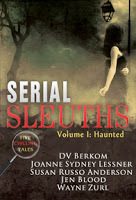
Jen: I’m already
accepting submissions for the next volume, a collection of romantic shorts for
the Valentine’s Day season due out in February. Right now I’m working to
determine which non-profit will benefit from sales. 100% of net proceeds from every
volume of Serial Sleuths will be
donated to a different organization. Those interested in submitting a story can
find guidelines at http://erinsolomon.com/serial-sleuths/.
The deadline is December 15, 2012.
October 23, 2012
The Perils and Pitfalls of Writing with a Partner
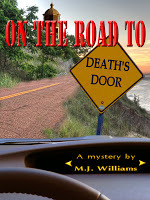
By Peggy Williams & Mary Joy Johnson
Ever want to kill your partner? Life partner? Business partner? Bridge
partner?
Instead of wanting to kill each other, the writing partnership M. J.
Williams regularly kills off other people--three last year, three more this
year! We are mystery writing partners.
Mary Joy brought to the relationship years of teaching writing on the
college level. She's written several long technical tomes, but this was her
first attempt at novel writing. She's also an avid reader of mysteries. Peggy's background includes freelance
writing--everything from video scriptwriting to feature articles in magazines
to online content. She reads mysteries
among other genres, but what she brings to partnership is her knowledge of
story structure as developed through screenwriting.
Most writers, when we tell them we work as a team, are astonished. They say they could never write with someone
else, and they wouldn't want to. We
admit collaborative writing is not for everyone. There are some disadvantages,
but there are advantages as well. And there are some things writing teams can
do to keep the experience from turning into a murderous affair.
Advantages of
Writing with a Partner
·
We
build on one another's strengths.
·
We
bounce ideas off one another and brainstorm together.
·
We help
one another through blocks or slumps--that is, if one of us can't think of
anything to write about a scene, the other usually can, and then the first
develops and expands on that.
·
We push each other by assigning deadlines and
holding each other accountable.
·
We share the marketing and utilize each other's
strengths. For instance Peggy enjoys
working social media outlets. Mary Joy
prefers person-to-person selling. When
something is tough or onerous, such as approaching a bookstore to take books on
consignment, we can ho and hum together and then finally go together to get the
job done.
·
When we do book/author events, we have a traveling
partner who gets what we're going through and how we are feeling (both positive
and negative).
·
When one of us is feeling insecure, either writing
the story or marketing, we can turn to the other to bolster us up.
·
We have someone to share bragging rights with,
someone to turn to when our egos have been stomped on.
Disadvantages
of Writing with a Partner
·
We have to defer to one another's vision for
the story, characters, or details; this requires constant negotiating and
compromise.
·
We have to work around another person's
personal schedule (what do you mean she's too busy quilting this week to get
her chapter done?).
·
The biggest disadvantage? We have to share the royalties!
Tips for
Successful Writing Partnerships
·
Be
humble. Sometimes that bit of prose you think was brilliant, your partner hates--and she's probably right.
·
Communicate
often, either meeting in person, on the phone, or by e-mail.
·
Outline the book thoroughly.
This will be the road map and the working agreement for the story.
However, be flexible and be willing to change the outline as need dictates.
·
Establish
deadlines for one another.
·
Revise
lots because that's where your voices blend and become one. Sit together, read the story chapter by
chapter together, and negotiate changes to story, dialogue, and details.
·
Recognized
individual strengths and utilize them. Peggy always defers to Mary Joy when it comes
to plotting a mystery; Mary Joy trusts Peggy's need for logic and sense of story
pacing. Peggy loves writing and shaping
dialogue. Mary Joy loves describing people and settings (including home
interiors!).
·
Laugh a
lot! Have fun with the experience.

Peggy Williams and Mary Joy Johnson write under the penname M. J.
Williams. Their On the Road mystery series features Emily and Stan Remington
who travel in a used RV and encounter murder and mayhem wherever they go. Their first novel, On the Road to Death's Door, takes the couple to Wisconsin's Door County, a popular vacation spot surrounded
on three sides by Lake Michigan.
Passion, Lucidity, and Tenacity: Keys to Being a Writer
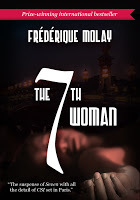
Passion, lucidity and tenacity: keys to being a writer
Anne Trager, founder of Le French Books, talks with international bestselling author Frédérique Molay
Imagine writing a book in your spare hours, between work in politics and home life. Imagine keeping it in your drawer until your friends say you have to submit it for a prize. Imagine then that you win France’s most prestigious crime fiction award, that your book rockets to the top of the bestseller list and is named Best Crime Fiction Novel of the Year, that you leave your day job and dedicate your life to writing. No, this is no fairy tale. It is the story of Frédérique Molay, the author of the international blockbuster The 7th Woman, which is now available in English. She’s been called “the French Michael Connelly,” and I was lucky enough to translate this book. She and I talked about writing and here I share some of her secrets.
Can you describe what motivated you to become a writer?
When I was a rookie journalist, by luck and stubbornness, I had the opportunity to do an exclusive interview of Mary Higgins Clark and spent several hours with her face to face on May 14, 1992. It was an unforgettable moment. I found her so professional, so kind. The picture of the two of us together still hangs above my desk. I remember one scene that day in particular. We were in a limousine that had just stopped at a red light in the middle of Paris, and Mary Higgins Clark began to talk. It was like she was building the scene for a new novel. She whispered, ‘Imagine, a man you don’t know approaches and opens the unlocked door and, there the story starts!’ I still can’t get over the opportunity it was for me, a rookie writer, to meet one of the greats. It was necessarily motivating. I would write at night, while holding down a job with responsibilities and raising three kids. When I won Quai des Orfèvres prize andThe 7th Woman was so well received, I took the leap and I dedicated my life to writing.
Where do your stories come from?
I set The 7th Woman in Paris, a city I know well, as I was born there. Often, when I see a building or a stairwell I think to myself, “Now that’s a good address for a victim.” Each story stems from encounters, articles I’ve read in the papers or heard about. I like to start with human reality in what it has that is darkest, stepping in the real settings and then building a story from it. But beware, you need to have a Cartesian approach, because each piece of evidence must have a consequence in the story. It’s like a Rubik’s cube. You can’t take anything for granted.
What are you trying to do with your writing?
More than anything, I want my readers to keep turning the pages. Weaving suspense over the pages in a mystery plot right through the resolution is a fine game between the author and the reader. In no other genre do you get this kind of interaction as in crime fiction. Ultimately, you can only write what you have inside. I am an eclectic reader, and as an author I have a taste for criminal investigations, and more generally for thrillers and suspense. Some people claim that crime fiction writers are constantly looking for the truth, that they pinpoint what is lurking in the shadows, they love to raise people’s awareness. This is certainly true, without forgetting that the goal, simple, is to give readers a good time and some chills!
What does it take to write?
A book is like a child you bring into the world. You keep it inside of you for months, and then it’s born and takes on a life of its own. It’s a curious feeling. You need to be a bit of a solitary wolf when you write. You find yourself alone in front of the page or your computer screen, along with just your imaginary characters. Very few people can actually have this kind of intimacy, I think. I need to have someone I can trust, to whom I read my chapters, with whom I work things out when I’m feeling doubts, someone who encourages me in my passion.
Writing requires regular work. The more you do it, the easier it becomes. Writing is a passion, a necessity. You have to be modest, self-critical, and be able to get people to help you. After your imagination has worked full out, and the last word has been put on a manuscript, corrections take time. Writing, like so many things in life has something to do with talent, but it is mostly about work. It takes passion (obviously), lucidity (a minimum that grows over time), and tenacity (limitless).
Le French Book is having a special promotion of The 7th Woman starting on October 23. This edge-of-your-seat police procedural has all the suspense of Seven, with CSI-like details, set in Paris. It won France’s most prestigious crime fiction award, was named Best Crime Fiction Novel of the Year, and is already an international bestseller. For the launch, Le French Book giving away a trip to France, French wine and lots of other gifts. They also dropped the usual list price for a limited time. Check it out: http://www.the7thwoman.com

About the author
She’s been called “the French Michael Connelly.” After The 7 th Woman took France by storm, former politician Frédérique Molay dedicated her life to writing and raising her three children. She has five books to her name, with three in the Nico Sirsky series, with a fourth in the writing.
About the translator
The translator, Anne Trager has lived in France for over 26 years, working in translation, publishing and communications. In 2011, she woke up one morning and said, “I just can’t stand it anymore. There are way too many good books being written in France not reaching a broader audience.” That’s when she founded Le French Book to translate some of those books into English. The company’s motto is “If we love it, we translate it,” and Anne loves crime fiction.http://www.the7thwoman.com/
October 21, 2012
Don’t Be Boring
 When I read writing rules posts, they usually remind me of the old grammar rules. You know, like: i before e, except after c…but there are exceptions.
When I read writing rules posts, they usually remind me of the old grammar rules. You know, like: i before e, except after c…but there are exceptions. There are exceptions. If we know the writing rules and just choose to ignore them, then we might well be doing something innovative. Of course, if we don’t know the rules and break them, then we might well be in trouble.
But this post by James Scott Bell, entitled “The Three Rules for Writing a Novel,” was different. In fact, he could really just have written a post called “The One Rule for Writing a Novel” and it would have been just as good because of the “rule” he listed first:
Don’t bore the reader.
Here’s an excerpt from the post:
RULE # 1 - DON’T BORE THE READER
Can anyone disagree with that? Doesn’t it make sense that this should be emblazoned across the writer’s creative consciousness as the most foundational of all rules?
If you bore the reader, you don’t sell the book. Or, at least, if the reader does manage to make it to the end, you don’t sell your next book.
It’s a rule. In fact, it’s a law, just like gravity.
**********
I’d hate it if readers skimmed through large portions of my book because it was boring. I’d hate it even more if they didn’t finish the book or if they skipped buying my next book.
What makes a boring book? Some of that answer is going to be subjective. Or related to genre. Or related to personal preference. I think most of us would agree that a big backstory dump full of set-up information is going to be boring. On the more subjective level, for me, I can be bored by really elegantly worded, descriptive passages. I can be impressed by them—but ultimately disinterested.
What’s boring? I think this is another one of those instances where it’s helpful to be very familiar with the genre we’re reading—what’s the pace of these books? What’s normal for the genre?
In most stories…something has to happen. That may sound really obvious, but there are plenty of books out there (and I’ve started reading a ton of them), where either nothing much happens, or nothing much happens in the first half of the book.
I’m currently writing a book that I’m very consciously working at not making boring. It’s a country house murder—you know the set-up…remote location, cut off by weather, limited suspects, limited setting.
It’s the kind of plot that could get boring if it’s not approached well. I brainstormed a list of ideas for keeping a fast pace and increasing the tension in the country house. There are different ways to hook your reader or keep your reader hooked. For me, my list ranged from minor irritants like losing electricity during the ice storm, to dead bodies. :) It’s basically just making the reader curious about what happens next.
Ingredients that can help spice up a story:
Tension
Conflict (internal and external)
Humor
Characters that pop on the page
Characters that are dynamic and change during the course of the story
Subplots
Complex antagonists
Romance/sex (depending on the story/genre)
Increased stakes and challenges for our characters
Protagonists that don’t take a backseat role in their own adventure
Setting (If it’s really done right and when it’s almost serving as a character in the book.)
What can you add to the list? What makes books interesting to you? What are your favorite elements to add to your own books?
Image—Flickr—Daniel James
October 20, 2012
Twitterific

Twitterific is a compilation of all the writing links I shared the previous week.
The links are fed into the Writer’s Knowledge Base search engine
(developed by writer and software engineer Mike Fleming) which has over 18,000
free articles on writing-related topics. Sign up for our free newsletter for
monthly writing tips and interviews with top contributors to the WKB or like us
on Facebook.
Try “My
WKB”--a way for you to list and sort articles, view your read articles, and see
your search history. Read more about it here: http://bit.ly/S9thqS .
The free My WKB page is here: http://bit.ly/PV8Ueb .
Han Versus Luke – Who's the
Better Hero? http://bit.ly/Rmm41A
@tiffanyreisz
7 Tricks to Add Variety to Your
Dialogue: http://bit.ly/Rmmt4b
6 ways to avoid becoming a
literary mimic: http://bit.ly/QWgYM8
Getting Superheroines Right: http://bit.ly/RmmzZz @79SemiFinalist
John Cleese: The Top 5 Things
You Need For Creativity: http://bit.ly/QWh86i
@jacobkrueger
Writing a Novel: Chapter
Breaks: http://bit.ly/RmmPrs @writersdigest
How often should you blog? http://bit.ly/QWhfPd @NinaAmir
Blogging a book--making the
most of your material: http://bit.ly/QWhERI
@JFBookman
There is no secret handshake: http://bit.ly/QWhI3I
To fix your story's 3rd act, go
all the way back to the 1st act: http://bit.ly/P14unX
Eating Your Way to a Healthier
Writer Brain: http://bit.ly/Qb0JXR
@AugstMcLaughlin
Why 1 reader's ebook conversion
only goes so far: http://bit.ly/P14JiY
@ImogenRW
The Theology of Screenwriting:
Predestination: http://bit.ly/Qb1ct1
@gointothestory
A Different Kind of Format
Issue: http://bit.ly/Qb1n7u @theresastevens
How to Keep Your Book in a Top
100 Category: http://bit.ly/P150SS
@TweetTheBook
Building Your Agent List: http://bit.ly/Qb1Czp @BretBallou
Forms of fantasy: http://bit.ly/P15eta @fantasyfaction
Plotting Your Novel
Conceptually: http://bit.ly/P15wQP=
@Janice_Hardy
Dealing with Criticism: http://bit.ly/P16gp6 @msheatherwebb
5 Easy Ways to Increase Your
Blog's SEO for Writers: http://bit.ly/Qb3NmK
@jeanoram
16 Observations About Real
Dialogue: http://bit.ly/P16ooC @joebunting
Tips for reading your work
aloud: http://bit.ly/Qb488P
The Theology of Screenwriting:
Doubt: http://bit.ly/P16DQp @gointothestory
How Great Writers Change the
World: http://bit.ly/P16Q6i @KristenLambTX
5 reasons to self-publish your
book: http://bit.ly/Qb4AUA @beth_barany
Use Adverbs to Create Music for
Your Readers' Ears: http://bit.ly/P16VHe
@NealAbbott
An explanation of "small
presses": http://bit.ly/Qb4Wuu
@KarenGowen @cleemckenzie
Tomatoes and the Writing Habit:
http://bit.ly/P17iBu
Waiting is the Hardest Part: http://bit.ly/Qb5Nvl @Anna_Elliott
Facebook vs. Twitter: Where The
Readers Are: http://bit.ly/RMPFDS @roniloren
Tips for better dialogue: http://bit.ly/Tmvr68 @mooderino
3 steps to a daily writing
habit: http://bit.ly/V0a0nr @beth_barany
The 5 Best Literary TED Talks: http://bit.ly/RXXTsJ @BooksAreMyBFs
A brief history of the vampire
novel: http://bit.ly/RXY1sa @andrewliptak
6 failing blogging
personalities: http://bit.ly/V0ajib
@UndeadClay
Why Story Beginnings and
Endings Must Be Linked: http://bit.ly/V0ak5L
@KMWeiland
How to Stay Motivated to Finish
Your Writing: http://bit.ly/V0axGa
@writerscoach @womenwriters
Top 10 Self-Sabotaging Mistakes
of Author-Bloggers: http://bit.ly/RXYxXi
@annerallen
The Sensual Writer: Touch vs.
Feel: http://bit.ly/V0aUk3
Why You Should Edit Your First
Draft for Captain Obvious: http://bit.ly/RXYHht
@haikumoedee
6 Benefits of Writing Every
Day: http://bit.ly/RXZf6O @LyndaRYoung
Literary versus genre fiction –
what's the difference? http://bit.ly/RXZdvL
@dirtywhitecandy
Historically accurate fantasy: http://bit.ly/V0bBK4 @fantasyfaction
Principles of Integrated
Marketing: http://bit.ly/V0cJgR
Food in fantasy: http://bit.ly/RY0xPe @fantasyfaction
The Whys and Hows of
Paraphrasing: http://bit.ly/V0cOB5
@writing_tips
Books for brushing up on
grammar: http://bit.ly/V0cSkh @MorganMandel
3 More Ways Google Supercharges
Your Searches: http://bit.ly/RY0Fyd
@JFBookman
Frontloaded Characters: http://bit.ly/V0d2rQ @stevenpiziks
37 Negotiation Tactics for
Every Freelance Writer: http://bit.ly/RY1abs
@copyblogger
How to Use Music as Writing
Inspiration: http://bit.ly/V0dh6n
@write_practice
4 Tips for Increasing Pinterest
Traffic to Your Blog: http://bit.ly/RY1fft @SMExaminer
9 Frequently Asked Questions
About Query Letters: http://bit.ly/V0dqGN
@ChuckSambuchino
5 tips for successful
self-pubbing: http://bit.ly/RY1wPw
@DeniseMSwank @LauraHoward78
3 Classic Strategies for
Writing a Bestseller: http://bit.ly/V0dEhn
@yeomanis
Guilt-Free Creativity: Stop
Kicking Yourself & Start Producing: http://bit.ly/RY1Bmk
@99u
Are Your Characters' Body Parts
Acting on Their Own? http://bit.ly/RY1JSF
@janice_hardy
A closer look at story
structure: http://bit.ly/V0dVRd
@KristenLambTX
Cliffhangers For Unscrupulous
Writers: http://bit.ly/XcLBOI @mooderino
The Theology of Screenwriting:
Guilt: http://bit.ly/V0zdnB @gointothestory
Tips for being creative on
demand: http://bit.ly/XcLYJ3 @DIYMFA
What the Way You Retweet Says
about You: http://bit.ly/V0B2AX
@AnnieNeugebauer
Affect vs. Effect: http://bit.ly/V0B8IP @howtowriteshop
Top 10 YA Agents: 72 Deals: http://bit.ly/XcOsqE @fictionnotes
The strange and unpleasant
world of the sock puppet: http://bit.ly/V0BleQ
@cathinnorway
How to Find the Perfect Niche
Audience for Your Blog: http://bit.ly/XcOKhg
@nickthacker
The Value of a Good Book: Is
the Reading Public Cheap? http://bit.ly/V0BKOr
@ninabadzin
A Tip for Writing More: http://bit.ly/XcPgvM @threekingsbooks
Want Help With Editing? Try
Free Editing Programs: http://bit.ly/OFvRTd
@woodwardkaren
What Helen Keller Taught Us
about Creative Thinking: http://bit.ly/RyBnnS
@MichaelMichalko
On Editors and Revisions: http://bit.ly/RyBy2H @davidbcoe
(Most) Characters Can't Read
Minds: http://bit.ly/OFwI6n @noveleditor
Tips for book signings: http://bit.ly/RyCe89 @jodyhedlund
10 Topics Writers Should Talk
About When Promoting Their Book Online: http://bit.ly/RyDDeQ
@bubblecow
Building Deep Conflict into
Novel Structure: http://bit.ly/RyDPuJ
@4YALit
Turning Inspiration into a
Plot: http://bit.ly/RyDV5E @susanjmorris
Why time travel stories should
be messy: http://bit.ly/RTp6uN @i09
10 worst mistakes bloggers make
when using photos: http://bit.ly/RTpfOT
@copyrightLaws @PublicityHound
Free Riding, Free Expression,
and Familiarity in Genre Fiction: http://bit.ly/RFGxS8
@redrobinreader
Show versus Tell: Macro-,
Micro-, and When to Use It: http://bit.ly/RFGFkF
@stdennard
How You Can Use Headphones To
Improve Your Writing: http://bit.ly/RTpyJm
@fuelyourwriting
Sagging Middle Syndrome: How To
Rescue Your Novel: http://bit.ly/RFHcDe
@glencstrathy
On Cultivating Instinct: http://bit.ly/RFHFW4 {lang}
Can Amazon Turn Out-of-Print
Books Into Gold? http://sm.wsj.com/RTwmGX
@smartmoney
8 Epic Heroes Who Committed
Mass Murder: http://bit.ly/RFNItP @i09
The New Adult Genre: Here To
Stay This Time? http://bit.ly/RTwF4J
@roniloren
Who v. Whom: http://bit.ly/RFNUJt @brianklems
10 Creative Block Breakers: http://bit.ly/RFO83i @thecreativitypost
Why A Break From Writing Will
Kill Your Spirit: http://bit.ly/RFOl6s
How Fake Reviews Hurt Everyone:
http://bit.ly/RFOt68 @jamigold
Ebook Pricing Strategy for a
Stand Alone Novel: http://bit.ly/RFPw61
@goblinwriter
Pinterest: The Best New Source
of Traffic: http://bit.ly/RTyezq @HeidiCohen
Who You Know Can Make a
Difference: http://bit.ly/RFPJGi
@rachellegardner
Secondary Characters Have a
Life of Their Own: http://bit.ly/RTyjmX
@livewritethrive
7 Point Plot System: http://bit.ly/RFPV8o @juliemusil
October 19, 2012
The Importance of Looking Ahead…and of Not Looking Ahead
by Elizabeth S. Craig, @elizabethscraig
 The last few years, I’ve kept a very strict writing schedule—mostly because of the deadlines that I had from the two imprints I was working for, Penguin NAL/Obsidian and Penguin Berkley Prime Crime.
The last few years, I’ve kept a very strict writing schedule—mostly because of the deadlines that I had from the two imprints I was working for, Penguin NAL/Obsidian and Penguin Berkley Prime Crime.
Some of the time the deadlines got really close to each other (which no one wanted—not me, my agent, nor my editors), but it just happened that way with the production schedules.
Sometimes I had hurry-up-and-wait scenarios, sometimes I was editing a book with one series and drafting one for another and promoting something that had just released with one of the series.
But it was all pretty much laid out for me—outline due to this editor by X date. Manuscript due to that editor by X date. Revisions back by X date. Pass pages approved by X date.
I’ve finished two books in late-spring/early summer that will come out in in February and July of next year. Now I’m working on a book that’s due in February and will release in 2014. In between, I wrote a book for self-publishing, which I’ll put out in November.
After that—I’m not sure what I’ll have on my plate because I’ll be out of contract. What usually happens is that the publishers like to look at sales of book 2 with the series to see if they want 2 or 3 more books after the 3rd book comes out. With the Memphis Barbeque series, they watched sales on book 2 and 3 and decided to contract me to a 4th book.
Hopefully, after February’s release, the numbers will be good and my editor for the quilting mysteries will ask for 2-3 more books to follow the one coming out in 2014…that would extend my work with Penguin into 2016 or 2017.
But that’s totally out of my hands. If I try to plan for more Memphis books or more quilting mysteries…there’s just no point. I could sketch out proposals for the next books (sometimes they’ll ask for that in the editorial meetings when they discuss extending the series with the publisher.) But there’s no way I’m going to make the assumption the series will continue and write the next books….it’s not like I can just change the character names and use the books some other way. The books are definitely branded to those series.
So…there’s no point in trying to figure out what’s going on in late 2013 and 2014. Looking ahead, in that respect, does no good at all. That’s like counting chickens before they hatch.
But planning ahead for stuff we can control makes a lot of sense. I’m eager to write more Myrtle Clover books. Demand for the series is up, sales are going well, and I’m the one who ultimately decides the future of that series. So my plans, post-February are for right now and unless I find out differently, to write two Myrtle Clover books from March—December 2013 and edit the 3rd quilting book for Penguin for its 2014 release.
Keeping busy by working on new projects is one of the best ways to survive the snail-like pace of the publishing schedule—whether you’re querying, waiting for revisions, or waiting for your book to release. Not only does it keep your skills sharp and keep you busy, but it can result in more stories to query or self-publish.
Why I like coming up with my own production plan for the next year (although I know it might be subject to change):
Deadlines help me stay motivated. I found with the self-pub book I just finished that it’s better if I apply a deadline for it like the ones I get from my publisher.
Seeing my plan in writing helps me approach the year in a more organized way—and I can even have a tentative budget in place for costs and possible earnings.
It gives me information/updates to post on my website. I’ve been actually, pleasantly, surprised that readers actually do seem to want to know what I’m working on. I noticed other writers putting their production schedules up on their websites and decided to give it a go. I’ve had nice feedback on that and a decrease in the number of emails I’d gotten asking when there would be a release for one of the series.
If you’re interested in making your own production plan for the next year (or even a five-year plan…I’ll include that link, too), here are some great posts to help you think it through:
Dean Wesley Smith’s: Think Like A Publisher: Production and Scheduling
This is D.D. Scott’s (a successful self-pubbed author’s) production plan for this year: The Indie Epub Journey: Ebook Production Schedules 101
Another example of a production schedule, with the addition of a business plan, from author Denise Grover Swank: A Business Plan for Self-Pubbed Authors.
Susan Kaye Quinn recommends we develop a five-year plan for our writing career in her post, The Incredible Lightness of Being Indie.
How are you approaching your writing and goals? Have you ever considered a production plan? Do you ever commit your goals to writing?
Image: MorgueFile: mensatic
October 16, 2012
Chapter Breaks and Cliffhangers
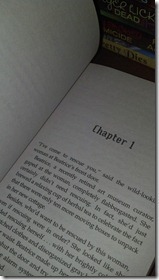 Every time I read a great post on cliffhangers, I feel a little sorry that I don’t write too many of them. It can make for a thrilling chapter ending, if the device isn’t overused.
Every time I read a great post on cliffhangers, I feel a little sorry that I don’t write too many of them. It can make for a thrilling chapter ending, if the device isn’t overused. I don’t actually spend very much time thinking about my chapter breaks. I write the books straight through with no chapter breaks at all, then insert the breaks before I hand the book over to my editor.
My chapter breaks were inserted fairly haphazardly until a couple of readers mentioned them….one in a review and one in an email. These folks wanted shorter chapters to accommodate their busy schedules and short amount of reading time.
Most of my chapters averaged 18 pages at the time that I got that reader feedback. Not really feeling very strongly about chapter breaks one way or the other, I decided to accommodate the readers and write shorter chapters…I started inserting chapter breaks about every 10-12 pages. I found that it did affect the pace of my books—it made the books read a bit faster….which is nice, for my genre.
What I generally do is look for a spot where there’s a good place for a break. Occasionally, there’s a spot that’s perfect for a break because there’ll be a dead body discovered. :) In that case, I rework the chapter breaks around that one to fit it in.
One thing that I try not to do is to close a chapter at the point when my character turns in for the night. I’d heard this wasn’t good because the reader would put the book down for the night, too. So I’ll usually just put a scene break, not a chapter break, there.
Some areas make great spots to put chapter breaks in. Every 10-12 pages, I look for interesting bits of dialogue (maybe the sleuth asks a suspect a leading question), someone making an announcement of some sort, a strong scene ending, a question the protagonist has posed or worried over, a moment of tension…and, sure, the typical cliffhanger moment: the moment the protagonist realizes someone is breaking into her house, the discovery of the dead body, the moment the killer confronts the sleuth…you know.
As a reader…yes, sometimes I do enjoy a good cliffhanger of a chapter ending. If it’s used at the end of every chapter, then I feel like it’s totally contrived. But sure—I love that moment where I decide that I just have to read the next chapter.
And I ran across a nice post on cliffhangers on the Moody Writing blog by Mooderino: Cliffhangers For Unscrupulous Writers. :) It lists eleven types of cliffhangers to use.
Do you use cliffhangers often? How long are your chapters or do they vary a lot in length? Where are your favorite spots to insert chapter breaks?
October 14, 2012
Help Readers Suspend Disbelief (and Avoid Plot Holes)
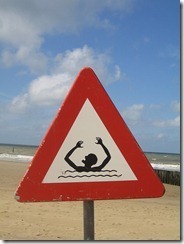 The other night, I watched a mystery on television. The actors were good, the puzzle itself was good, and the setting—a boarding school— was interesting.
The other night, I watched a mystery on television. The actors were good, the puzzle itself was good, and the setting—a boarding school— was interesting.The problem that I absolutely couldn’t get past was that a horrible murder had occurred at this boarding school—and life at the school continued as usual, apart from the presence of the investigating officers.
As a parent, I’ve seen a phenomenon play out over the years, rightly or wrongly, where parents descend on a school en masse to retrieve their kids….for just about any reason.
Ice storm predicted to commence? They’re coming. A teacher somewhere at the school suffered a fatal heart attack on the grounds? They’re coming. Power outage in part of the school? They’re on their way. Crazed murderer stalking students on campus….oh, they’re SO there.
But in this production, classes resumed as usual (where are the guidance counselors and the child psychologists?), giving the killer another shot at a murder a couple of days after the first one—which, of course, the killer took advantage of.
I understood why the screenwriters set it up that way—they couldn’t shut down the murderer. The writers had an objective to accomplish. But once I fell into this plot hole, I couldn’t climb out of it…it bothered me that much. It simply wasn’t realistic at all.
What probably would have worked well is if they’d written in a short scene with concerned parents at the school, and the school administration and police calming down everyone and insisting that the school was safe. They needed to address the plot problem straight on. If they didn’t want to write that scene, they could even have shot a short scene in the dean’s office where he’s frantically fussing over the number of phone calls and meetings he’s had with parents to persuade them to keep their children at the school.
I’m well-acquainted with plot holes. Unfortunately, I sometimes write them into my own manuscripts. In the last editorial letter I got from my editor for the quilting mysteries, my editor pointed out that my elderly sleuth’s daughter would surely be more interfering than she was…especially considering the circumstances I’d put the sleuth in. She suggested an easy fix—temporarily distract the daughter by a huge task that she’s trying to undertake. Easy enough. The daughter wasn’t a cold-hearted person, but her lack of involvement came across to my editor that way.
The best way I’ve found to fix these issues is to address them head-on and early in the book. We usually create these problems purely because of plot convenience. Most of the time we can keep our set-up as long as we acknowledge the unbelievable part early and somehow offer an explanation. It’s not hard to do and it can prevent us from losing a reader.
Do you ever run into these kinds of plot problems as a reader, viewer, or writer?
Photo: Señalética Patricia, Flickr
October 13, 2012
Twitterific

by Elizabeth S. Craig,
@elizabethscraig
Twitterific
is a compilation of all the writing links I shared the previous week.
The links are fed into the Writer’s
Knowledge Base search engine (developed by writer and software engineer Mike
Fleming) which has over 18,000 free articles on writing-related topics. Sign up
for our free newsletter for monthly writing tips and interviews with top
contributors to the WKB or like us on Facebook.
Try “My WKB”--a way
for you to list and sort articles, view your read articles, and see your search
history. Read more about it here: http://bit.ly/S9thqS .
The free My WKB page is here: http://bit.ly/PV8Ueb .
Teens and Dystopias: http://bit.ly/WpcH4J @scottwesterfeld
1 writer's position on fanfic: http://bit.ly/WpdJ0v @ceciliatan
The Stephen King Guide to
Marketing: http://bit.ly/O7ORcG @storyrally
Crafting Truly Bad Villains: http://bit.ly/O7P5AG @FaceAPStylebook
After The First Draft: Attitude
Is Everything: http://bit.ly/O7PhzV
@petersalomon @angelaackerman
Weaknesses–Our Hidden
Strengths: http://bit.ly/WpfUkO @Rllafevers
Creating Two-Word Characters: http://bit.ly/O7Pymm @nickthacker
12 Tips for Communicating
Criticism: http://bit.ly/WpiB5V @12most
13 Desktop Wallpapers To
Kickstart Your Creativity: http://bit.ly/Wpj5J3
The Struggle for Ideas: http://bit.ly/SXdkhN @janice_hardy
List of Writing Resources: http://bit.ly/PPK3WG @woodwardkaren
Desk exercises for writers: http://bit.ly/O7fvm4
Twitter networking tips: http://bit.ly/SCudSG
The Problem with Fantasy Maps: http://bit.ly/PFDQeM @LBGale
The benefit of free writing: http://bit.ly/SCuyEN @joe_bunting
Why Amazon Publishing? http://bit.ly/PFEx7R @thezombiebible
@passivevoiceblg
7 ways to build a platform
through blogging: http://bit.ly/PFEDMS
10 things 1 writer learned
about the publishing process: http://bit.ly/PFFhd4
@UndeadClay
12 reasons to write poetry: http://bit.ly/SCvcCo @kdbelmonte
Caring about your story and characters..but keeping yourself detached: http://bit.ly/OTLM1C @mkinberg
Using the Present to Inspire
Your Dystopian: http://bit.ly/SCvp8z
@GenniferAlbin
How To Get Amazon's Top
Customer Reviewers To Review Your Book: http://bit.ly/TacIFv
@thecreativepenn
Impact Characters: http://bit.ly/URIzfL @camillelaguire
How Do Writers Get Their Ideas?
Neil Gaiman, Seth Godin & Stephen King: http://bit.ly/RKb00z
@woodwardkaren
1 successful self-pubbed
author's recommendations for ebook pricing: http://bit.ly/TacSN2
@deanwesleysmith
An editor with a list of don'ts
for anthology submissions: http://bit.ly/RKbeoD
How To Outline a Book with
Trello: http://bit.ly/TacZIG @mediabistro
5 Ways to Convey a
Sense of Place: http://bit.ly/RMQtIO @LeFrenchBook
What Picasso Can Teach You As A
Screenwriter: http://bit.ly/RKbjIP
@jacobkrueger
Tricking Yourself Into
Creativity: http://bit.ly/Tad52U @thinkjar_
5 Reasons Writers Aren't the
Only Authority About Their Books: http://bit.ly/RKbrYN
@Care2Causes @passivevoiceblg
Fantasy As Escapism: Avoiding
Boredom or Uncertainty? http://bit.ly/Taddzg
@erchristensen
Creativity and IQ: http://bit.ly/RKbyU4 @iqmindware
Tips for pitching: http://bit.ly/Wo6lTg @rachellegardner
Finding the Best Place to
Write: http://bit.ly/TadQJf @howtowriteshop
6 Things To Do When Your Song
Is Finished: http://bit.ly/TafeeN
In Media Res: An Ancient Secret
for Beginning Your Novel: http://bit.ly/kqGf3S
@glencstrathy
8 Non-writing Apps for Writers:
http://bit.ly/Tafj27 @problogger
Our Storytelling Minds: Do We
Ever Really Know What's Going on Inside? http://bit.ly/RKdcoT
@mkonnikova
Writers Conferences: Are they
Relevant in the E-age? http://bit.ly/Tafomx
@annerallen
Plotting with index cards: http://bit.ly/RKdhsx @glencstrathy
Article Marketing Reprint
Strategy – Pros and Cons: http://bit.ly/TkTVN9
@karencv
Character Arc: The Hero's
Journey: http://bit.ly/WGNIdc
Use Article Writing To Discover
What You Value: http://bit.ly/TkUhU6
@thewritermama
What Unexpected Thunderstorms
Can Teach About Protecting the Work (avoiding publishing ind. negativity): http://bit.ly/WGOgQm @jan_ohara
Explaining your story's world
while avoiding exposition: http://bit.ly/NPmYG9
@dirtywhitecandy
5 bad habits of good writers: http://bit.ly/TkV2fF @AliciaRasley
How to Write so Google Finds
You: http://bit.ly/WGP5IW
Why Your Story's Conflict Isn't
Working: http://bit.ly/WGXz2K @KMWeiland
Why 1 agent goes to writers'
conferences: http://bit.ly/Tl40JR
@rachellegardner
11 factors for enhancing blog
readership: http://bit.ly/WGXSe3 @HeidiCohen
2 Unbreakable Laws of
Self-Publishing: http://bit.ly/Tl4hg3
@jamesscottbell @livewritethrive
Writing For Non-Paying Markets:
http://bit.ly/WHmkfb
Choosing Your Main Character
and His/Her Counterpart: http://bit.ly/m2JxUb
@glencstrathy
Authorial Words Containing
"WIP": http://bit.ly/TmtvL3
@Jan_Ohara
Online Writing Resources: http://bit.ly/WIotaD @danyelleleafty
Voice, Tone, and Costuming: http://bit.ly/TmtYNb
Enrich Your Writing By Keeping
It Simple: http://bit.ly/WIoKtZ
@sophie_novak
Motivating Stimulus and its
Importance to Your Novel: http://bit.ly/Tmuxqf
@AimeeLSalter
Top 10 things freelance writers
should check before turning in a story: http://bit.ly/WIpgs3
@michellerafter
5 Tips to Overcome Fear of
Rejection: http://bit.ly/Tmv5fK @lafreeland
The Theology of Screenwriting:
Sin: http://bit.ly/WIpWh1 @gointothestory
Tips for better dialogue: http://bit.ly/Tmvr68 @mooderino
Tips for writing humor: http://bit.ly/WIqJhO
"Emotional
glue"--what it is, and how to include it in your story: http://bit.ly/R7F5Ys
When Do Clauses Need Commas ( a
Review): http://bit.ly/WIz0SX @noveleditor
The value of a great ending: http://bit.ly/R7FfPy @79SemiFinalist
3 Steps to Creating Your Own
Writing Luck: http://bit.ly/WIzhFF
@writeitsideways
How To Know If You've
"Made It" As a Writer: http://bit.ly/R7FtWV
@krissybrady
Tips for getting to know your
protagonist: http://bit.ly/WIzJUd
@DeeWhiteAuthor
8 Secrets Of Successful Indie
Romance Writing: http://bit.ly/R7G0bF
@woodwardkaren
3 Tips For Getting Your Music
In A Commercial: http://bit.ly/WIAkW0
Preparing for a Conference: http://bit.ly/R7GgY2
10 Novels That Deserve a
Prequel: http://bit.ly/TdyW9x @flavorpill
Need Inspiration? Expand Your
Horizons: http://bit.ly/RMO5la
1 writer's editing process: http://bit.ly/TdzsVa @authorterryo
How to Define a Bulletproof
Work-at-Home Mindset: http://bit.ly/RMOh3W
@JWhite
60 Affirmations for Authors,
Writers, and Poets: http://bit.ly/TdzP1R
Interview with
Writer/Illustrator Debbie Ohi: http://bit.ly/TdA90A
@inkyelbows
The High Bar of Finding an
Agent or Publisher: http://bit.ly/TdAbFG
@jamigold
The Power of Story: http://bit.ly/TdAjFo @lisaunger @junglereds
Building Your First Website:
Resource List: http://bit.ly/RMOEeU
@janefriedman
Wrangling Long Sentences: http://bit.ly/TdB952 @theresastevens
When Should a Writer Stop
Marketing a Book? http://bit.ly/RMPfNF
@jodyhedlund
Facebook vs. Twitter: Where The
Readers Are: http://bit.ly/RMPFDS @roniloren
How writers can use Evernote to
get organized, be more productive: http://bit.ly/TdBJ2L
@michellerafter
Focus Your Creativity Using
Visual Methods: http://bit.ly/TdBO6v
@originalimpulse
Ebook pricing & Extending
Pottermore concepts to other brands: http://bit.ly/RAcOau
@Porter_Anderson @philipdsjones @charliered66
Find and Replace with Word,
Using Wildcards (helpful when formatting): http://bit.ly/RMPQyN
via @woodwardkaren
Let your characters be wrong: http://bit.ly/TdBZ1u @juliettewade
How To Format A Word Document
For Amazon's KDP Publishing Program: http://bit.ly/RMPY1r
@woodwardkaren
Character motivation: belief or
disbelief in a genetic predisposition to violence: http://bit.ly/TdCclh
On Perfection and Painting: http://bit.ly/OT0Mg7 @nadinekenney
Covert bullying in YA: http://bit.ly/UQVFd3 @Word_Tapestry
@jeanniecampbell
Resisting the 3 Steps to
Embracing Your Muse: http://bit.ly/OT15aR
@PatrickRwrites
A technique for networking on
Twitter: http://bit.ly/UQVLl0 @alexisgrant
Writing Fictional Curses: http://bit.ly/OT1jPh @chihuahuazero
5 Free Services That Help You
Build an Author Platform: http://bit.ly/UQVRsK
@janefriedman @turndog_million
The heroine's journey: http://bit.ly/OT1D0i
2 subcategories of heroes and
villains: http://bit.ly/UQWlzc
@SophieMasson1
So you've got an agent. Now
what? http://bit.ly/OT2rCt
Generating Suspense in Fiction:
http://bit.ly/UQWC55 @luannschindler
The Power of Reaction: http://bit.ly/OT2AWo @kid_lit
Why the Adverb Isn't as Dead as
Mark Twain Would Like: http://bit.ly/UQWDWO
@KMWeiland
Revision: Six Steps to Story
Strength: http://bit.ly/OT2IoN
@howtowriteshop
31 Book Marketing Ideas: http://bit.ly/OT31jr @duolit
Tips for Sideloading Ebooks: http://bit.ly/UQX1EC @susankayequinn
How To Find the Top Customer
Reviewers on Amazon: http://bit.ly/OT3dPC
@galleycat
What to Bring to a Book Fair to
Sell Your Books: http://bit.ly/UQXaI6
@beth_barany
3 Ways to Make a Good Story
Great: http://bit.ly/OT3m5G @yeomanis
Frankfurt Book Fair: "Mr.
Bezos, tear down this wall!": http://bit.ly/Q4V5q1
@Porter_Anderson @jwikert
5 Ways to Deal With Down Days: http://bit.ly/TFyBCb @ajackwriting
Increase Sales by Writing for
the Web More Effectively: http://bit.ly/Q4VpFh
@KarenCV
Why 1 Writer Volunteers for
Writing Festivals (and Why We Should, Too): http://bit.ly/Q4VQiK
@writerscramp1
Why Do Books Have Chapters? http://bit.ly/Q4VWqR @ClarionUCSD
Using Distant and Tight Third
Person: http://bit.ly/Q4W21y @susanjmorris
Craft: 3 Tips From an Agent: http://bit.ly/TFzH0T @Porter_Anderson
@JennyBent
Query writing tips: http://bit.ly/Q4WrB1 @amandaccarlson
3 Ways to Make a Good Story
Great: http://bit.ly/OT3m5G @yeomanis
Do You Believe These 3
Publishing Myths? http://bit.ly/TFAjnd
@JFBookman
5 Steps to Yes: Make a Good
Impression with Your Cover Letter: http://bit.ly/Q4WGMD
@ClarionUCSD
How to Choose Critique
Partners: http://bit.ly/TFADC9 @ava_jae
Content is King: http://bit.ly/Q4X4uo @kristinerusch
Where is Urban Fantasy Headed? http://bit.ly/TFBkvl @sfsignal
The conference prowl: http://bit.ly/TFC8k1 @LAGilman
Tips for Writing A Great Duel
Scene: http://bit.ly/Q4Yc1c
12 Imaginary Places: http://bit.ly/Q4YhlA @writing_tips
Your Facebook Page May Be
Blocking Your Fans: http://bit.ly/TFCxTy
@roniloren
hree Ways to End a Horror
Story: http://bit.ly/Q4YqW2 @ClarionUCSD
MFA Programs: A Peacemaker's
Viewpoint: http://bit.ly/TFCW8i @ZanyLetters
@Porter_Anderson
When the protagonist becomes
worse than the antagonist: http://bit.ly/QWg0zt
@glencstrathy
The Power of "I" in
Your Blog: http://bit.ly/RmkwEO
@PatrickRwrites
Structure vs. Strategy: http://bit.ly/RmkE7k @storyfix
6 Ways to Make Your Readers
Hate You: http://bit.ly/Rml39D
@write_practice
First Line to Last Line: A Fine
Balance: http://bit.ly/Rmlfps
@randysusanmeyer
Elements of YA: http://bit.ly/QWgwgQ
7 Ways Twitter Sharpens Your
Writing: http://bit.ly/RmlGA2
How to Write Proficiently About
Things You Don't Know: http://bit.ly/QWgJRh
@jodyhedlund
October 11, 2012
Looking at Life Through a Lens
 I’d been wanting to read something a little different, so I glanced through my TBR (to be read) list. Keith Richards’
Life
was on there, and I figured I couldn’t possibly go any different than that. I’d become interested in him because I’d read an article in the Times UK a couple of years ago that Richards had always had a longing to be a librarian.
I’d been wanting to read something a little different, so I glanced through my TBR (to be read) list. Keith Richards’
Life
was on there, and I figured I couldn’t possibly go any different than that. I’d become interested in him because I’d read an article in the Times UK a couple of years ago that Richards had always had a longing to be a librarian. The book was an interesting read—definitely eye-opening in sections. :) And entertaining, since I have such a quiet life and am a pretty reserved person and Keith Richards…we’ll just say that Keith and I don’t have much in common. Well, except for the fact that we’re both parents. And one other similarity—the way we both observe the world through a lens:
The radar is on whether you know it or not. You cannot switch it off. You hear this piece of conversation from across the room, “I just can’t stand you anymore”… That’s a song. It just flows in. And also the other thing about being a songwriter, when you realize you are one, is that to provide ammo, you start to become an observer, you start to distance yourself. You’re constantly on the alert. That faculty gets trained in you over the years, observing people, how they react to one another. Which, in a way, makes you weirdly distant. You shouldn’t really be doing it. It’s a little of Peeping Tom to be a songwriter. You start looking round, and everything’s a subject for a song.
Richards, Keith (2010-10-26). Life (p. 183). Hachette Book Group. Kindle Edition.
Some days it all comes naturally to me and everything is a story. Some days I have to remind myself that I’m looking for material, words, character descriptions and quirks, etc.
If you ever find yourself blocked, a change of scenery can frequently do an amazing amount of good. Not only are you escaping your house and whatever might be distracting you/keeping you from working, but you also have the opportunity to be inspired by other people and places.
I’ll sit in the carpool line at the high school and work to finish my page goal that I start each morning. I have the car off and the windows down and I’m completely surrounded by characters…usually the same characters each day, too, so the characters' stories unfold as a serial. The woman who comes in backwards on the one-way school driveway each day (even though a cop stopped her a week ago and gave her a warning.) The grandfather who listens to World War II era songs in his car while eating a pack of crackers. The middle aged guy who drums his fingers on the side of his car while staring off into space.
I’m a character too, writing every day as I wait. I push my seat all the way back to accommodate my laptop. Sometimes I’ll accidentally blow my car horn from enthusiastic typing. :)
Do you write on the go much? Do you feel like you look at the world through a lens?
Image: MorgueFile—Procrastinator



